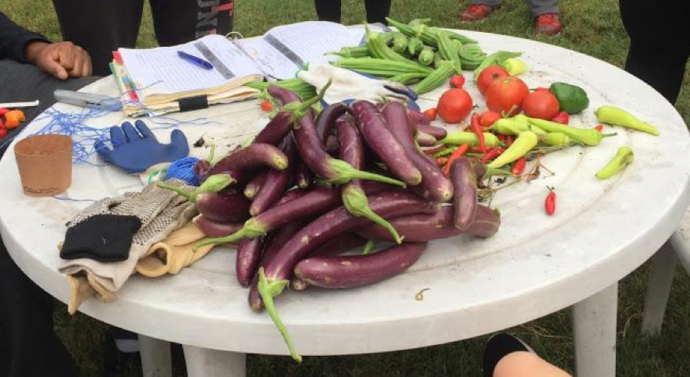
Getting their hands dirty: Drury CORE class participates in community garden
Campus News February 24, 2018, Comments Off 101What does the future of food look like?
That question is precisely what Dr. Peter Meidlinger’s CORE 201 class is determining through his class “The Future and Ethics of Food.” This is the third semester Meidlinger has taught this course and he said that he learned a lot from his fall students’ feedback. The class is focused on learning about how food is made, looking at different eating habits and overall analyzing what people are putting into their bodies.
One aspect of the class was serving at the community garden. This community garden is located adjacent to Cox North Hospital.
“I decided to take my students from my class last year to the community gardens a few times,” Meidlinger said.
Over the course of the semester he said he asked the students a few different times what they wanted to do more of and what they wanted to do less of. Through feedback from his students Meidlinger reconstructed how he taught the class this semester.
“Almost unanimously that class said ‘we should go to the garden more often.’ This semester I took the leap and said whenever it’s nice and there’s work to do on Fridays we’ll go to the garden,” Meidlinger said.
Similarly to last semester, students this semester have loved working in the community garden.
“So far this group has really, really enjoyed it,” he said.
For Meidlinger and his students to be able to work in the garden he had help from his neighbor, Louise Wiencowski.
“Louise loves gardening and is a master gardener. When I told her I had a group of students who were eager to work in the garden, she said come on up,” he said. “She meets with us every Friday. We help make beds and we plant plants. We [also] work in the greenhouse.”

Part of the produce picked when CORE 201 students worked in the community garden in the fall. Photo by Taylor Perkins.
Meidlinger said that his class is working to help build a gazebo at the garden as well.
Through this course, Meidlinger hopes that his students learn a few different lessons.
“I want them to be a part of the community and I want them to be closer to nature,” he said. “I want them to leave the class with some technical understanding of how gardens get built in the spring. I want them to learn enough about gardening that they become more aware of the value of raising fruits and vegetables so that they can take it back to their own communities once they graduate.”
He sees gardening as a hobby as well as a political statement.
“The future of food depends on us. I think if we do it right, the future of food is that as a nation we start making sane policies about what we eat. From a political point of view, we should be making fresh food available to all of our people, especially the poorest among us. We should have policies that make food readily available, inexpensive and tasty. I want my students to be aware and be better advocates for children. This is so that they can teach children from a young age that food is a great pleasure and a great source of nutrition,” Meidlinger said.
Article written by Taylor Perkins